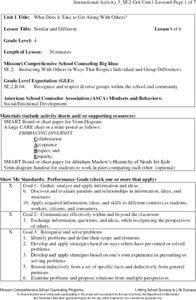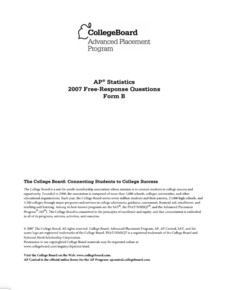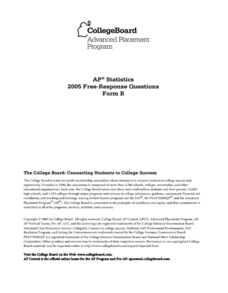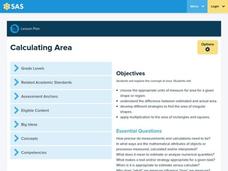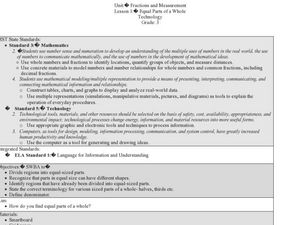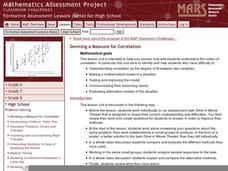Shodor Education Foundation
Plop It!
Build upon and stack up data to get the complete picture. Using the applet, pupils build bar graphs. As the bar graph builds, the interactive graphically displays the mean, median, and mode. Learners finish by exploring the changes in...
Curated OER
Nuclear Chemistry Project
Radiation has numerous real-world applications, some of which are relatively safe while others can be extremely hazardous. In this nuclear chemistry project, young scientists choose a practical use of nuclear reactions to...
Curated OER
Narrow Corridor
Buying a new sofa? Learn how to use the Pythagorean Theorem, as well as algebra and graphing techniques, to determine whether the sofa will fit around a corner (which I'm sure you'll agree is a very important consideration!).
Teach Engineering
Android App Development
Building an accelerometer app for your Android device. Groups develop an app that uses the accelerometer on an Android device. The purpose of the activity is to reinforce the programming design. The post activity assessment challenges...
EngageNY
The Converse of the Pythagorean Theorem
Is it a right triangle or not? Introduce scholars to the converse of the Pythagorean Theorem with a lesson plan that also provides a proof by contradiction of the converse. Pupils use the converse to determine whether triangles with...
Missouri Department of Elementary
Similar and Different
Using a Venn diagram, pupils compare the similarities and differences between two classmates. Next, they review the CARE acronym (Collaboration, Acceptance, Respect, Empathy) and discuss how it applies to diversity in the classroom.
College Board
2007 AP® Statistics Free-Response Questions Form B
So that is how they do it! Pupils and teachers see how College Board assesses topics using the free-response questions from Form B of the 2007 AP® Statistics test. The six questions are divided in two sections, the first five being...
College Board
2005 AP® Statistics Free-Response Questions Form B
Here's another great way to learn from the past. Released free-response questions provide a look into how concepts measured on the 2005 AP® Statistics Exam on Form B. Teachers and pupils review questions that cover concepts such as...
Curated OER
How are Trig Ratios Used to Measure Triangle Sides
Students identify the ratios of trig identities. In this geometry lesson, students solve the missing sides and angles of triangles using trig ratios. They relate the graphs and waves to real life scenarios.
Curated OER
Using Different Non-Standard Units to Measure
In this math worksheet, students use a variety of non-standard measurements units to find the lengths of objects on paper and around the room. Students first make an estimate, then measure with different units.
Curated OER
A Weighty Task
Students aim to explain the need for standardization of units of measurement. They pose their own standards for the value of a kilogram and compare them with the currently used standard.
Curated OER
Forest Measurements
Students analyze timber and use measuring techniques to figure board feet. In this investigative lesson students learn why accurate measurements are important and how to convert standing timber to board feet.
Curated OER
The Measurement Web
Second graders review their knowledge of measurement by making a concept web. They write the measurement words on chart paper and discuss them. They use Kidspiration to make the web using the computer. They add new words as they proceed...
Curated OER
Angles and Measuring
Learners identify various angles and how to measure each type. They use a protractor to measure each of the angles. Students also write the name of the angle and identify the number of degrees for each.
Curated OER
Measuring Temperatures
Fourth graders participate in a teacher-led discussion about temperature--hot and cold. Each group of students is assigned specific materials for their lab experiment. They record temperatures measured in their journals and then plot...
Pennsylvania Department of Education
Multiplication Using Arrays
Explore the concept of multiplication by using arrays. Classmates use arrays to gain a better understanding of multiplication. They break arrays apart to model the distributive property of multiplication over addition. The relationship...
Curated OER
Fractions and Measurement
Using a Smart Board, or a plain ol' white board or chalkboard, the teacher pulls up a grid and demonstrates how squares and rectangles can be divided up into equal parts. The class will get their own graph paper to draw shapes and divide...
Curated OER
Devising a Measure for Correlation
How well does your class understand the concept of correlation? Use an activity to explore different methods of calculating correlation. Working alone and then in groups, your class will make decisions on what math to apply to the...
Curated OER
I Can Use a Worm to Count
Kindergarteners use worms, puppets or other props to practice counting to 100. First, they listen to a read aloud of Count Worms by Roger Hargeaves. A worm pattern is used to count to 100, with each segment of the worm...
Pennsylvania Department of Education
Problem Solving by Using Multiplication to Solve Division Problems
Students use index cards, counting cubes, and their own understanding to identify how division problems can be solved by using multiplication. In this division lesson plan, students use their multiplication skills to solve division...
Curated OER
Use Measurement
In this measurements worksheet, students read the word problems and use the measurements within the problem to solve the six word problems.
Curated OER
Spoonfuls, Cupfuls and Handfuls
Explore the use of non-standard units for measuring volume with elementary learners. They fill a container and count the number used using cups, spoons, and bottles, build with blocks and count the number of blocks used, and compare and...
Code.org
Bytes and File Sizes
A bite of bits. The first instructional activity in a unit of 15 introduces the class to the byte. Pupils learn about other standard units for measuring file sizes, develop an understanding of relative sizes and the kind of units...
Teach Engineering
Efficiency of an Electromechanical System
How efficient is a motor in a LEGO set? Future engineers conduct an activity where a LEGO motor-generator system raises an object to a specified height. They then show what they learned and use their measurements to calculate the energy...





